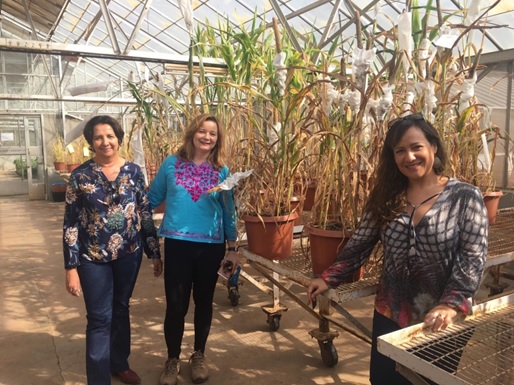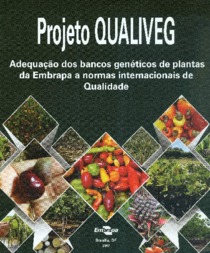Quality management at Embrapa gene banks a model for international agricultural research institute in India
Quality management at Embrapa gene banks a model for international agricultural research institute in India
The good results Embrapa has obtained since 2011 in the implementation of quality standards and requirements in its laboratories, greenhouses, experimental fields and, more recently, in banks and collections of plants, animals and microorganisms awakened the interest of the International Crops Research Institute for the Semi-Arid Tropics (ICRISAT), one of CGIAR (Consultative Group on International Agricultural Research)'s international centers located in India. The plant banks maintained in the Institute work as a genetic foundation for current and future food security for the peoples of the African and Asian semi-arid regions, and it is thus very important that they comply with national and international quality standards.
Upon ICRISAT's invitation, the researcher Clarissa Castro, from the Secretariat of Institutional Development, and the technician Zilneide Amaral, from Embrapa Genetic Resources and Biotechnology, visited the Institute in the period from November 23 to December 11, 2018, where they conducted a diagnosis of the current status of the plant gene banks with regard to quality best practices, raised teams' awareness and recommended actions related to such practices.
The pressing need to have the bank adhere to quality standards was identified by the researcher from Embrapa Genetic Resources and Biotechnology Vânia Rennó, who for a year has worked as head researcher of the facility at ICRISAT. She was selected through an international competition to work for three years as Head of the Gene Bank at this CGIAR center. “Despite ICRISAT's vast experience in the characterization, conservation and sustainable use of plants of interest for agriculture and food, I noticed that the good practices in the management of such resources needed to be modernized and adjusted to international quality standards. I pledged for the visit of the Embrapa specialits and my request was fulfilled”, the researcher explained.
International bank is important for Africa and Asia's food security
ICRISAT's gene bank is used as a world repository of six compulsory crops - sorghum, pearl millet, finger millet, chickpeas, pigeon peas and peanuts - and five small millets (foxtail millet, proso millet, little millet, kodo millet and barnyard millet). It contains over 126,830 germplasm accessions from 144 countries through donations and collection missions. Their gene banks also relies on regional collections in Niamey, Niger where there are over 44,000 accessions and in Bulawayo, Zimbabwe, with over 20,000 accessions of ICRISAT's target crops.
Just like at Embrapa, most of the collection is stored in the long term as seeds at -20°C as a backup for the active collection and breeding programs. It also deposited accessions (111.000) in the world seed bank Svalbard Global Seed Vault, in Norway, as a security backup.
The active collection is stored at 4°C and 30% relative humidity, and is their basic source for distribution and use. Between the years 1975 and 2018, more than 792,000 samples were distributed for users from 148 countries, besides 697,000 samples for scientists within the Institute.
Throughout its 45 years of existence, more than 55,000 accessions were repatriated by nine national programs in Asia and in Africa (collections lost due to natural calamities, civil conflicts, etc.), it promoted tests and launches of 104 cultivars in 51 countries and released 1019 varieties in 81 countries.
According to Vânia, the Institute's work towards current and future food security for the peoples of the African and Asian semi-arid regions is extremely important. The main focus of ICRISAT comprises reducing poverty, hunger, malnutrition and environmental degradation. The gene bank is the core of the entire work, since it ensures the genetic basis for cutting-edge research tip in the areas of biotechnology and genomics. “Therefore, investing in quality management is fundamental. It is what is going to ensure the collections levels of excellency and compliance with national and international standards, biosafety regulations, accessibility and harmonization of procedures and processes”, she asserts.
Quality management adds value to gene collections
On May 06, 2019, Clarissa and Zilneide taught a seminar at the Biomas auditorium, in which they showed the results of the visit to the international partner institution located in India. According to them, ICRISAT's director, Peter Carberry, and the whole team involved in the management of the gene bank were very receptive, especially as the benefits from quality management can impact not only employees' routines, but also improve services and exchanges provided by the Institute to national and international partners regarding standardization, traceability and reliability.
The best practices shared were based on the six corporate quality requirements used in the management of Embrapa's plant collections, namely: documents (external and internal ones, especially for the standardization of procedures); registrations (printed and electronic material); staff (training and supervision of employees and collaborators); field and lab facilities (compliance, maintenance and standardization); environmental conditions (compliance and control); equipment and traceability of measurement (maintenance, verification and calibration).
According to specialists in quality management, the diagnosis of ICRISAT's gene bank included: visits to the areas, interviews, document and record analysis, assessment of the infrastructure, oversight of their work routine, meetings, collection of objective evidence, oral presentations and reports.
During the diagnosis, they started actions to raise awareness among the teams and technical recommendations to ensure the implementation of the quality requirements and of the 5S Program (initiative based on five concepts - Sort, Set in Order, Shine, Standardize, and Sustain - to improve the workplace and productivity).
The positive points indicated by the analysis of the Institute's gene bank include the teams' proactivity, which are motivated and have well-defined responsibilities and the elaboration of SOPs (Standard Operational Procedures) for the collection, conservation and characterization of plant genetic resources. Another point that was praised by the Embrapa experts was the bank's maintenance.
There are several managerial, technical, equipment, instrument and machinery SOPs in place at ICRISAT. According to Clarissa, guidance was given to all elaborated documents regarding: summary, heading, footnotes, introduction, description of reviews, junction and separations, equipment, health and occupational safety, and training.
The researcher presented to the international institute's board and team the successful experience in the implementation of quality management at Embrapa's plant, animal and microorganism banks and collections, which started in 2016 with the projects QUALIVEG, QUALIANI and QUALIMICRO. Such project activities involved 20 microorganism collections at 17 Embrapa centers; six active gene banks (rice, beans, Capsicum, pineapple, cassava and cashew); gene bank (collections of plant gene resources, Brazilian Animal Germplasm Bank, Animal DNA and Tissue Bank, backup collection of microorganisms); and the Tissue Bank from Embrapa Goats and Sheep. In total, 1311 quality actions were performed out of a total of 2119 (62%) that are due by 2020.
Model to be extended to other CGIAR institutes
ICRISAT is composed of 15 research institutes and more than 8,000 scientists from several countries. Clarissa believes that actions to implement quality management will be extended to the remaining components of the Group.
ICRISAT is a non-profit, non-political organization that conducts agricultural research for development in Asia and Sub-saharan Africa, with a vast range of partners in the whole world. It is headquartered in Hyderabad, India, Telangana, and has two regional units and four offices in countries in Sub-saharan Africa.
According to the Embrapa specialists, this was only the first step towards the implementation of quality management in the Indian institute. The next stages include new visits to ICRISAT, and possibly also train the teams involved at Embrapa's gene bank, in Brazil.
Translation: Mariana Medeiros
Fernanda Diniz (MTb 4685/DF)
Secretariat of Research and Development
Press inquiries
Fernanda.diniz@embrapa.br
Phone number: +55 61 3448-4364
Further information on the topic
Citizen Attention Service (SAC)
www.embrapa.br/contact-us/sac/


